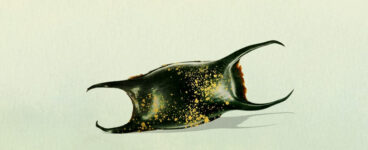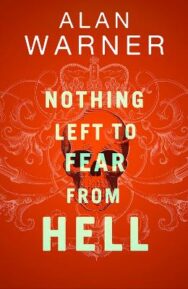David Robinson Reviews
‘But look again at that one scene – as far as I can tell, true to the historical record for 28 June 1746. It is absolutely irresistible, fusing daredevilry, humour and panache like a cross between Robin Hood and Some Like It Hot. No wonder Warner stuck with it.’
David Robinson finds Alan Warner’s novella a brilliant addition to the Darklands series.
Nothing Left to Fear From Hell
By Alan Warner
Published by Polygon
If you have read any of Alan Warner’s novels, you’ll already know that he doesn’t do predictable, whether in plot, style or character. Take Uncle, the one-eyed hoarder of pilchards and builder of domestic papier-mâché tunnels in The Man Who Walks. Who else would invent such a man – or, come to that, his crazed journey, pursued by his drifter nephew, to Culloden?
So what would you, dear reader, expect from a Warner novel which, chronologically at least, starts at the site of Scotland’s last battle? One which features not less a personage than Charles Edward Stuart, and whose title Nothing Left to Fear From Hell is emblazoned over a picture of a crowned skull on a blood-red cover?
Well, I’ll tell you what I thought I was in for. I didn’t think it would be anything as straightforward as the old, old story about the prince on the run from the redcoats, helped into his disguise as an Irish maid by Flora MacDonald and rowed over the sea to Skye. Not with that author, title and cover. Instead, Nothing Left to Fear from Hell would surely be about the not-so-bonnie prince of Roderick Graham’s 2014 biography, the boozy (six bottles of wine a day before he even moved onto the brandy) bloated, mistress-beating boor he became in later years. The Hell – the word dwarfs all others on the embossed title – would be the inescapable hell of regret: all those lives the Young Pretender wasted, all that loyalty and promise he betrayed, all those hopes twisted into tragedy. Nothing left to fear from hell because Charles Edward Stuart, the crowned skull on that goth-gladdening cover, is already in it.
And yet when Warner’s book opens, we are not in exile but still in Scotland. Twelve men on board a boat land on a Hebridean island shrouded in mist and midges. A tall pale man climbs out and promptly retches. He lowers his trousers. Diarrhoea too. If this is indeed the Bonnie Prince, it’s a version yet to appear on any shortbread tin.
But that’s the point. We already have an image of Bonnie Prince Charlie in our heads. We know the story too. How can Warner, in the latest book in Polygon’s excellent Darkland Tales series of stories from Scotland’s past, subvert that image without losing the Jacobite plot?
The trick, at first, is to gently mask expectations, to withhold chronological or geographical coordinates or explanations of relationships within the prince’s accompanying coterie, carefully smuggling them all past what EP Thompson called ‘the enormous condescension of posterity’ – the assumption that everything was always bound to work out the way it did and that people who ended up on the losing side of history really ought to have known better.
The story unfolding before us hardly belongs to the Ladybird school of history. In the land the fleeing Jacobites move across, the new British state is flexing its muscles. Haystacks have been pulled down and burnt, farms and blockhouses sacked, animals bayoneted. The Jacobites themselves are guided by older impulses of loyalty that make little sense to us secular moderns. ‘It’s God’s work about us here and we know it,’ Clanranald tells the Stuart Che Guevara.
And what of the Bonnie Prince himself? This is where Warner’s novella excels. Because if there’s one thing we know from history it is that Bonnie Prince Charlie must have had at least some charisma: he wouldn’t have gathered followers otherwise. And portraying charisma in cold print is, to say the least, tricky. How do you do it – particularly when, as here, on the prince’s five-month chase around the Highlands and Islands – there are no cheering crowds to make the point? What was it about him that made Highlanders refuse to clype even for a £30,000 reward (£8.5 million today)?
Warner’s Bonnie Prince Charlie is no saint. He doesn’t worry in the slightest about his moral responsibility for all those burnt-out farms and destitute Highlanders. He is impatient, suffers badly from ‘the terror Mitches’ and insomnia, and is quite capable of giving ridiculous orders, as when he shoots at a passing whale and asks his servant to dive into the sea and bring it back to the shore. (This actually happened.) He is arrogant, even to the point of walking alongside and chatting to the factor Alexander Kingsburgh on Skye while dressed as an Irish maid, when anyone encountering them would have considered this the very height of social impudence and therefore a complete giveaway. (Kingsburgh’s joke – ‘Sire, surely you are the worst pretender I have ever seen’ – also makes its way into Warner’s novel.)
But look again at that one scene – as far as I can tell, true to the historical record for 28 June 1746. It is absolutely irresistible, fusing daredevilry, humour and panache like a cross between Robin Hood and Some Like It Hot. No wonder Warner stuck with it.
Already, and so subtly that you hardly notice it, Warner has been quietly making Jacobites of his readers. Neil MacEachain – who spent most of May and June with the prince – is quoted pointing out how Bonnie Prince Charlie ‘whether meeting any person of high or low station … held a necessity to impose a high and always striking impression of his easy humour’. Not a snob, in other words. We have already glimpsed this in Bonnie Prince Charlie’s mildly sexist banter about the fair maids of Mull with the sailors rowing him to Lewis, when he also jokes about plans to disguise him as Captain O’Sullivan’s son.
The hardest thing about historical fiction is getting the dialogue right: too right and it is hard to follow, too modern and it becomes risible. Switching or nudging prepositions (‘he was with me at our army’, ‘both men were in the dram’ etc) is as effective in speech as Warner customary verbal freshness is in description (‘smoke rioted out of the blockhouse,’ ‘the shot jingled up the water’ etc). This may be Warner’s first attempt at historical fiction, but the language rings true.
So too does this portrait of Bonnie Prince Charlie. Charles Edward Stuart is down but not out. He’ll come back soon with the French, he tells anyone who will listen, and when that happens, victory will be all the sweeter for this brief taste of defeat. How much better to have that moment captured, when even a darkened future still had a sense of possibility, than the book I thought Warner was going to write – about the cursed, hellish days of the prince’s long, drunken exile in Paris, when the future had none?
Nothing Left to Fear from Hell by Alan Warner is published by Polygon, priced £10.
ALSO IN THIS ISSUE

 Museum Mystery Squad and the Case from Outer Space
Museum Mystery Squad and the Case from Outer Space
‘Someone’s sent the museum a blackmail letter threatening to steal a prized exhibit from the brand-n …

 Sea Bean: Patrick Jamieson Reviews
Sea Bean: Patrick Jamieson Reviews
‘I do hope Sally’s message is found and read by many – I’ve no doubt they’ll be better off for it.’













